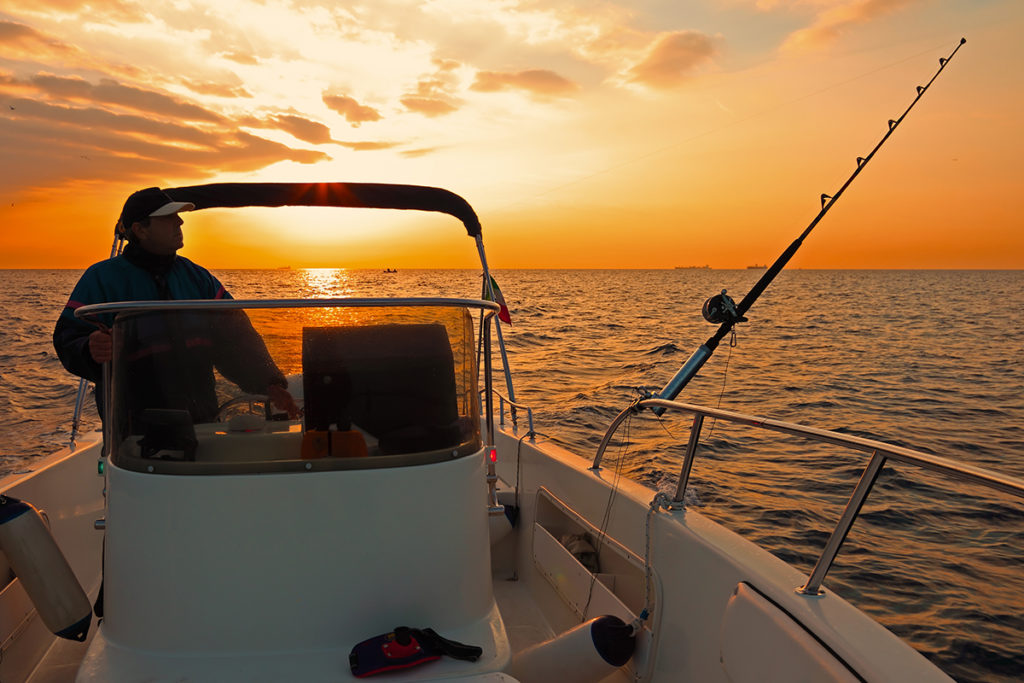Top 10 Most Important Boating Safety Tips

As the weather warms up, many of us head to lakes, rivers, or the ocean to fish, waterski, cruise, and relax onboard a boat, yacht, or other personal watercraft. With nearly 12 million registered recreational boats in the United States, it’s no wonder the waterways are a popular place to go. But, before you head out with friends and family, take note of a few important safety tips.

1. Choose the right life jackets and make sure everyone wears one.
In approximately 80% of fatal boating accidents the cause of death was drowning. Of those, 83% weren’t wearing a life jacket. Insist that your crew and guests all wear a life jacket that fits them well. This can help them stay afloat in rough waters, protect them against hypothermia, and in some cases, keep their head above water.
All boats must be equipped with at least one Type I (off-shore life jacket), Type II (near-shore buoyancy vest), Type III (floatation aid), or Type V (special use device) personal floatation device for each person on board. Boats that are 16 feet or longer must have an additional Type IV throwable device as well.
2. Assemble a boat safety kit.
Having the right tools when you need them can spell the difference between a problem and an emergency. That’s why you should prepare a boat safety kit with common items you might need if something goes wrong. Some items to include:
- First Aid Kit – For treating minor wounds and injuries.
- Bucket – For bailing out water that’s come over the side.
- Flashlight – For seeing in the dark if you’re stuck out at night without power.
- Fire extinguisher – For putting out fires.
- VHF Radio – For calling for help.
- Personal Floatation Devices (PFDs) – For keeping people afloat if they’re stuck in the water.
- Flares – For signaling your location in an emergency.
- Duct Tape – For temporarily patching leaks.
- Rope – For securing your craft or tying down loose objects in bad weather.
- Whistle – For signaling your position or intention to other boats.
3. Never drink alcohol and go boating.
Alcohol use is a leading contributor to fatal boating accidents, causing approximately 15% of deaths each year. Stay sharp when you’re on the water by leaving the alcohol on dry land.
4. Take a boating safety course.
Only 13% of boating deaths occurred on vessels where the operator had received a nationally approved boating safety education certificate. You may even qualify for a reduced insurance rate if you complete a safety course. Contact your local Coast Guard Auxiliary, U.S. Power Squadron chapter, or visit uscgboating.org for details.
5. Act before a storm hits.
Storm and hurricane forecasts and warnings are issued by the National Hurricane Center. Boaters can get information from VHF marine radios, commercial radios, television stations, and newspapers. As a boater, you need to be aware of these types of advisories and take action before a storm hits. Warnings range from small craft advisories, with winds of 18 knots or less, up to hurricane warnings with winds of 74 miles per hour (64 knots) or greater.
6. Register for a Maritime Mobile Service Identity (MMSI) number and get a VHF radio equipped with Digital Selective Calling (DSC) connected to your GPS.
When in coastal and inshore waters, these preparations help take the search out of search and rescue. DSC allows the VHF radio to transfer information digitally, and to instantly send a digital distress alert, which includes your exact position, to the Coast Guard upon activation of the emergency button. Part of the alert is the MMSI number, which will identify your vessel automatically.
7. Drive at a safe speed and follow all boating and safety navigation rules.
Excessive speed and improper lookout are two of the top contributing factors to boating accidents. Make sure you understand the local rules and laws of the waterway and follow them closely. Take note of visibility, traffic density, and proximity to navigational hazards such as shoals, rocks, or floating objects.
8. Put down the cell phone.
One of the top five contributing factors to boating accidents is inattention. Just like distracted driving on our highways, talking, texting, and other use of cell phones while boating is a growing problem on the water. Don’t contribute to this problem. Keep your eyes on the water ahead and around you.
9. Use a carbon monoxide detector.
All internal combustion engines emit carbon monoxide, a poisonous gas that can sicken you in seconds and kill you in minutes. Remember, you can’t see, smell, or taste CO, so know the symptoms (they’re similar to seasickness or alcohol intoxication).
10. Get a free vessel safety check.
Boats are complex machines and need regular maintenance to stay running smoothly and safely. The U.S. Coast Guard Auxiliary and U.S. Power Squadron offer Vessel Safety Checks at no cost, so let their certified vessel examiners check your boat’s equipment and provide you with safety information before you go out on the water. Check with your marina or yacht club to find one in your area.
Protect Yourself and Your Vessel
At Wallace, Welch & Willingham, we specialize in marine insurance. We offer flexible plans for almost every type of boat or personal watercraft. Contact us online or call us at 727-522-7777 to find out what you need to stay safe in rough waters.
Updated on May 8, 2023. Read the original article on Chubb.com.

